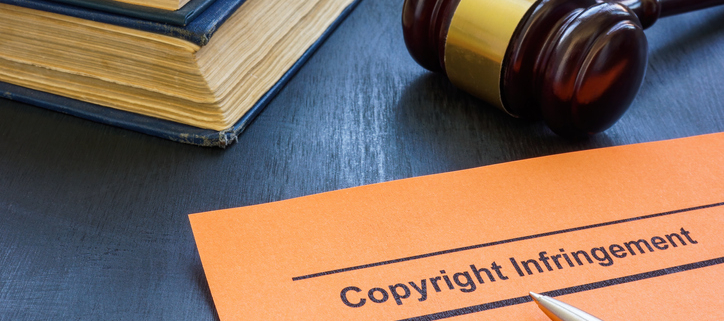One of the most common delays in building websites for small businesses is finding the right content, especially the right photographs to tell the story of the business.
For most small businesses, the amount of time and the costs of hiring a photographer, developing a shot list, and then combing through dozens of proofs just doesn’t seem like a good use of time.
Instead, the staff turns to Google and finds the perfect shot that truly amplifies the text on the page. It’s easy to pull from the Internet – just right-click and save the image.
It seems harmless. After all, the business owner isn’t selling the image or putting it on merchandise. It is just being used to showcase an idea.
But even using just one copyrighted image can result in fines up to $150,000, plus other penalties.
The attorneys at The Orlando Law Group can help defend you in a copyright case or help prevent others from using your copyrighted material.
What constitutes a copyrighted image?
Frankly, the assumption should be that just about any image cannot be used without permission from the owner.
The images in a Google search? Yes, those are copyrighted unless specifically marked.
The images you find in a promotional email? Yes, they are copyrighted.
The images on Instagram that a customer takes of your business? Yes, they are copyrighted.
Donald Trump’s Georgia mug shot? Yes, the Fulton County Sheriff’s Office owns it, although they are obviously not enforcing it.
The images your friend posts on Facebook? Yes, they are copyrighted too!
Again, virtually every image you see online has the assumption of being copyrighted.
To be clear, the images do not have to be registered with the government to be copyrighted.
According to the U.S. Copyright Office, “Your work is under copyright protection the moment it is created and fixed in a tangible form that it is perceptible either directly or with the aid of a machine or device.”
The only exception as to if an image is copyrighted is when an image’s copyright expires and becomes a part of the public domain. This does not happen very often, however, and you can learn more about this in our blog post about how Steamboat Willie is now part of the public domain.
What happens if you use a copyrighted image?
If you use a copyrighted image, the penalties can be significant.
In most cases, if you use a copyrighted image, you will probably receive a cease-and-desist letter, asking for the image to be taken down. And in most cases, reputable businesses will take it down.
Of course, that is the best-case scenario.
Sometimes, however, the person who owns the copyright may want to make your case an example so others don’t follow suit. Other times, the copyright holder may be a small business too, often a photographer whose entire business is based on selling photographs.
In that case, you can be sued for using copyrighted images and the consequences can be severe.
Just in fines, you could be looking at a minimum $200 fine for each image used with a maximum fine of $150,000.
Your website could be impounded, taking away one of your greatest tools to market your business.
You can be forced to pay for attorney fees.
Finally, you can also be forced to pay damages if it is proven that you earned any revenue from the use of the image. While that is usually formed with merchandise using copyrighted images, it could also be construed that your website delivered revenue to your business.
How to avoid using copyrighted images
The easiest way to avoid using copyrighted material is to hire a professional photographer. In that case, the photographer is providing you with photos that you paid to have the rights to. You can use these photos as you see fit.
If you are in a rush and need an image to reinforce your brand, then you can turn to a stock image site and purchase the images for your use. You are purchasing a license, and you must follow that license, but you can use it for most purposes – and they are exclusive to your business.
Some of the more popular stock image sites are iStock and ShutterStock. Plus, if you use Adobe products like Acrobat and Photoshop, the company has a large collection of images to use in its stock photo library.
In these cases, you will need to pay a fee to use them, and other businesses can buy the same image, but you will not get sued for using them.
There are some free stock image sites too, just make sure there is no fine print restricting use. For instance, some stock image sites offer photos to be used for personal use, but not for business use.
In the case of images used on social media by friends or customers, it’s always best to just ask them in writing if you can use the image. In most cases, the customer and friend will agree to let you use them.
What is someone is using a photo I took?
In nearly every case, it will take the use of an attorney to help stop copyright infringement. From the beginning, a cease-and-desist letter from an attorney will have a greater effect on a business owner than just a random email.
Plus, it can be sent certified, confirming the company received it.
The attorney can also help determine if you should sue for damages, especially if the photo was used in a way that damages your brand or was used for revenue production by the other company.
Finally, the attorney can help guide you to an applicable law enforcement agency if there are criminal implications to the assumed copyright infringement.
The attorneys at The Orlando Law Group help business owners dealing with copyrights in Orlando, Waterford Lakes, Altamonte Springs, Winter Garden, Lake Nona, St. Cloud, Kissimmee, and throughout Central Florida.
If you have questions about anything discussed in this article or other legal matters, give our office a call at 407-512-4394 or fill out our online contact form to schedule a consultation to discuss your case. We have an office conveniently located at 12301 Lake Underhill Rd, Suite 213, Orlando, FL 32828, as well as offices in Seminole, Osceola and West Orange counties to assist you.
The articles on this blog are for informative purposes only and are no substitute for legal advice or an attorney-client relationship. If you are seeking legal advice, please contact our law firm directly.
Last Updated on November 29, 2023 by The Orlando Law Group








